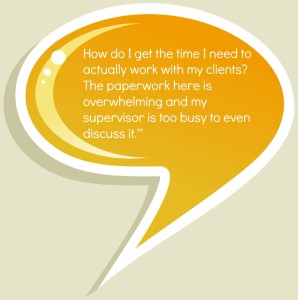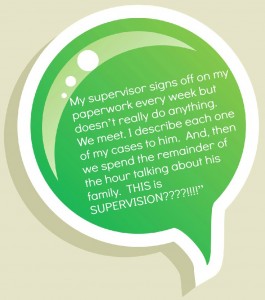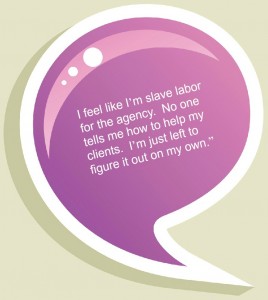
Every year the horror stories roll in . . . . What’s a new counselor to do? Having a great experience with clinical supervision doesn’t just happen in a vacuum. In case your graduate program forgot to tell you, here are nine things you can do to insure that you have the best supervisory experience possible.
- Interview several potential supervisors even if you think you already know who you want. Good supervisors will limit the number of counselors that they supervise so that they have ample time to spend with you.
- Once you ask someone to supervise you, ask for a written contract with that individual that specifies details of your professional relationship.
- Remember that supervision IS a professional and hierarchical relationship. Don’t blur those boundaries and don’t tolerate a supervisor who blurs those boundaries.

- Schedule regular meetings with your supervisor and make them a priority. Treat them as you would an appointment with any other professional. Expect your supervisor to do the same.
- Your supervisor should make arrangements to be available to you in case of client emergencies. If s/he is unable to do so, s/he should make arrangements for some other qualified professional to be available in her place.
- In the event that your supervision is not going as you had envisioned it would, you need to be prepared to initiate that conversation. Go in with an open mind, state your concerns and ask for what you need.

- If you have attempted to discuss the issue with your supervisor and are not satisfied with her response, you may seek consultations with peers. However, until the licensing board in your state or and attorney tells you otherwise, you are required to abide by the directives of your supervisor.
- If you are unable to satisfactorily resolve your differences with your supervisor, you may have the option to seek a new supervisor. However, note that some states limit the number of supervisors that you may use to satisfy licensing requirements. Check with your specific state to be sure of the rules related to this.
- Most important of all, if you should need to leave your supervisor behind due to a conflict, take the time for self-evaluation. Learn what you can about you and about this situation. It is not something that you want to repeat.
How is your supervision going?
Very nice information.
This is very interesting to me, Tamara. Clinical supervision for counselors is different from supervision in music therapy on a couple of different levels. For one, supervision is not a requirement in music therapy (although some of us believe it ought to be). For another, supervisees are not required to follow directives from supervisors (at least not to the best of my knowledge). I’m wondering if it’s a different situation in New York, where creative arts therapists at the master’s level can choose to be licensed. Am I understanding correctly that supervision for counselors is a licensing requirement? And is it ongoing or do you only have to have so many hours and then you’re finished? (So many questions!) :- )
Hi, Roia! It’s always good to have you probing voice here! For professional counselors, psychologists, social workers and some other creative arts therapists who are licensed, clinical supervision (typically 2000-3000 hours) is required before one can even apply for a professional license. This supervision may take place in both small group and individual supervisory sessions. During that period of time under supervision (which may range from 2-5 years according to each state’s laws), supervisees are legally and ethically required to comply with their supervisors’ directives.
Post-licensure, supervision (and mandatory compliance) ends. The exception would be if a professional chooses to pursue certification and advanced training in a particular technique such as clinical hypnosis or EMDR that requires, as part of the certification process, that you be supervised.
Once licensed, a therapist is ethically required to engage in clinical consultation. Although historically – and certainly as recently as I was initially licensed in 1991 – it was considered adequate to consult only when you felt you needed to. However, that professional standard is rapidly changing. Increasingly the professional associations of these mental health disciplines are stating that regular clinical consultation (in either individual or group) should be a part of every professional’s ongoing practice.
It’s a different word, isn’t it, Roia? And, it’s so interesting to hear about the different standards and expectations related to the different disciplines, too. Dialogue like this also helps all of us, I think, to better understand our colleagues’ professional cultures. It has been absolutely fascinating to hang out on the Music Therapy listserv to see some of the concerns and challenges that you guys are grappling with as your profession continues to grow and address professional identity and standards of training and competence.
It happens within each profession, of course. Professional counselors are a good example. Like music therapy, counseling, too, is a relatively young profession. Only in 2009 did the national professional counselors’ associations (30 of them!) spend time together over the course of an entire year to come up with a single definition of counseling that they could all buy into. It was quite an undertaking. I think it’s exciting to see the various disciplines continue to reflect and clarify who they / we are.
Roia, I’m rambling now so should probably stop and give someone else an opportunity to chime in here! Thanks again for stopping in to chat! I hope you’ll be back soon!